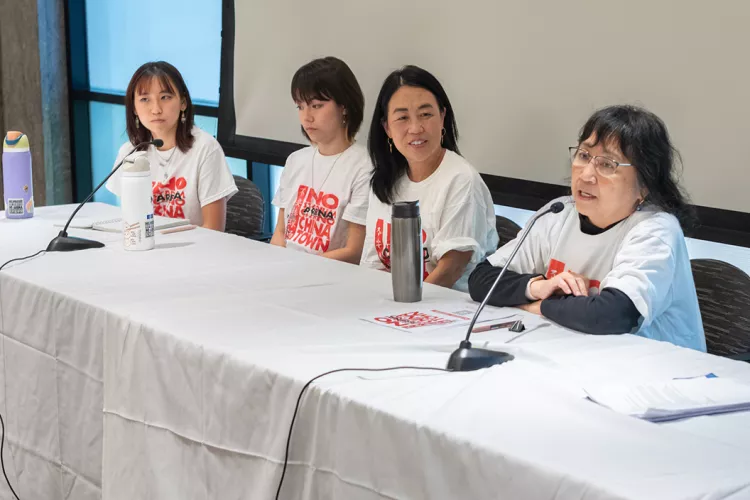Living Legacies: Two Generations of Community Organizing in Chinatown

From left: Kaia Chau and Taryn Flaherty, from Students for the Preservation of Chinatown, and Helen Gym, former Philadelphia City Councilmember.
Community is more than a geographic place, says Deborah Wei, the founding member of Asian Americans United (AAU).
“We fight for the geographic location, because of what it holds,” she says. “And what it holds is history, and memories, and relationships, and you can't take things like that. You can't put a monetary value on them.”
That theme ran throughout the panel on community organizing in Philadelphia’s Chinatown held by the Tri-College Asian American Studies Program in late September. It was organized and moderated by Assistant Professor of History Vivian Truong, and presented two generations of mothers and daughters working to preserve Chinatown’s history and location.
The panel featured Wei and Helen Gym, former Philadelphia City Council Member, alongside their daughters — Kaia Chau, a senior at Bryn Mawr College and Taryn Flaherty, a junior at the University of Pennsylvania, who are also the co-leaders of Students for the Preservation of Chinatown (SPOC).
Philadelphia’s Chinatown has been at the center of a highly contentious issue in the past several months: the proposal to build a basketball arena for the Philadelphia 76ers in Center City. In her opening remarks, Truong discussed this and the community’s history.
“Chinatown is not a stranger to projects that have threatened to displace a large portion of its population,” she said. “It actually began with displacement, Chinatown was first established in the 1870s as a haven for immigrants fleeing from anti-Chinese violence in the West.”
Among Wei’s earliest memories is visiting Chinatown with her parents. After working as a housing organizer, she started AAU in 1985 and began campaigning for Asian Americans across Philadelphia.
“We fought off the Vine Street Expressway, and then they built the commuter rail tunnel, which took all our housing between 8th and 9th Street,” said Wei. “Then they built the convention center, which took even more housing,” she added, before further highlighting the prison, stadium, and casino proposals that they fought against in the past two decades.
For Gym, joining AAU and fighting for Chinatown was inevitable.
“I walked into this tiny storefront on 8th and Arch St, and it just felt like there was so much energy, so much creativity, and opportunity as Asian Americans,” said Gym, who was the first Asian American woman to serve on the Philadelphia City Council.

From left: Chau, Flaherty, Gym, and Deborah Wei.
While AAU members were working on various projects around the country, Gym described their dedication to Philadelphia's Chinatown: “We made a decision very consciously that we were going to become deeply place-based.”
For Wei and Gym, there is something profound about staying in a place over decades, building relationships, and seeing history evolve. Following in their footsteps, their daughters, Chau and Flaherty, respectively, joined in the fight for Chinatown’s preservation.
“Fifteen years ago, both Kaia and I had a front row seat to see our mothers organize against large development when there were talks of a casino being built,” said Flaherty. “It’s a very moving experience to see family members, teachers, and classmates in the streets fighting the same fight.”
Chau and Flaherty started SPOC after the announcement of the stadium proposal, realizing that the developers responsible sat on the Board of Trustees for UPenn and Drexel. Inspired by their mothers, they kickstarted their coalition in October 2022 and staged a large protest through the city. They both stated that the role of students is “huge” in continuing these battles and eliminating the “predatory development” that Wei has been fighting against.
Chau described being frequently asked how she decided to get involved in Chinatown campaigning.
“For us, it was a question of how to do it, not whether we would do it,” she said. “Helen and Debbie being our moms gives us generational responsibility. They fought so hard for this community to exist.”



